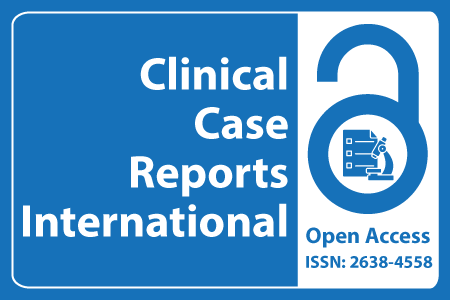
Journal Basic Info
- Impact Factor: 0.285**
- H-Index: 6
- ISSN: 2638-4558
- DOI: 10.25107/2638-4558
Major Scope
- Infectious Disease
- Pulmonary Disease
- Epilepsy and Seizures
- Microbiology
- Orthopedics & Rheumatology
- Preventive Medicine
- Child Birth
- Cardiology
Abstract
Citation: Clin Case Rep Int. 2022;6(1):1297.DOI: 10.25107/2638-4558.1297
A Case Report and Literature Review on Hepatoid Carcinoma of the Ovary
Jiana Li and Xiaohua Wu
Department of Gynecologic Oncology, Fudan University Shanghai Cancer Center, China
Department of Oncology, Shanghai Medical College, Fudan University, China
*Correspondance to: Xiaohua Wu
PDF Full Text Case Report | Open Access
Abstract:
Primary Hepatoid Carcinoma of the Ovary (HCO) is a rare, aggressive ovarian malignant tumor, morphologically resembling hepatocellular carcinoma and featuring with elevated serum Alpha- Fetoprotein (AFP) and Carbohydrate Antigen 125 (CA125). We report a case of a 64-year-old postmenopausal Chinese woman who presented with lower abdominal pain and vaginal bleeding. The patient went through a maximal debulking surgery and the pathological biopsy revealed hepatoid carcinoma of the ovary. The immunohistochemical staining showed that tumor cells were positive for AFP, spalt-like transcription factor 4 (SALL4), monoclonal anti-cytokeratin (AE1/3) and tumor Protein 53 (P53). After operation and one course of chemotherapy, the serum AFP dramatically declined to normal level and maintained for almost 2 years. Literature review demonstrates that the pathological and immunohistochemical features of HCO are not consistent, but elevated serum AFP is a common characteristic and SALL4 can be adopted to differentiate HCO from Hepatocellular Carcinoma (HCC). Although there is no conventional treatment for HCO, complete tumor debulking surgery followed by chemotherapy as shown in this case can be a potential option. The serum AFP, CA125 rather than Human Epididymis Protein 4 (HE4) can be employed as possible biomarkers to track treatment and monitor recurrence.
Keywords:
Hepatoid adenocarcinoma of the ovary; Ovarian cancer; HCO; AFP; Immunohistochemical staining
Cite the Article:
Li J, Wu X. A Case Report and Literature Review on Hepatoid Carcinoma of the Ovary. Clin Case Rep Int. 2022; 6: 1297.













